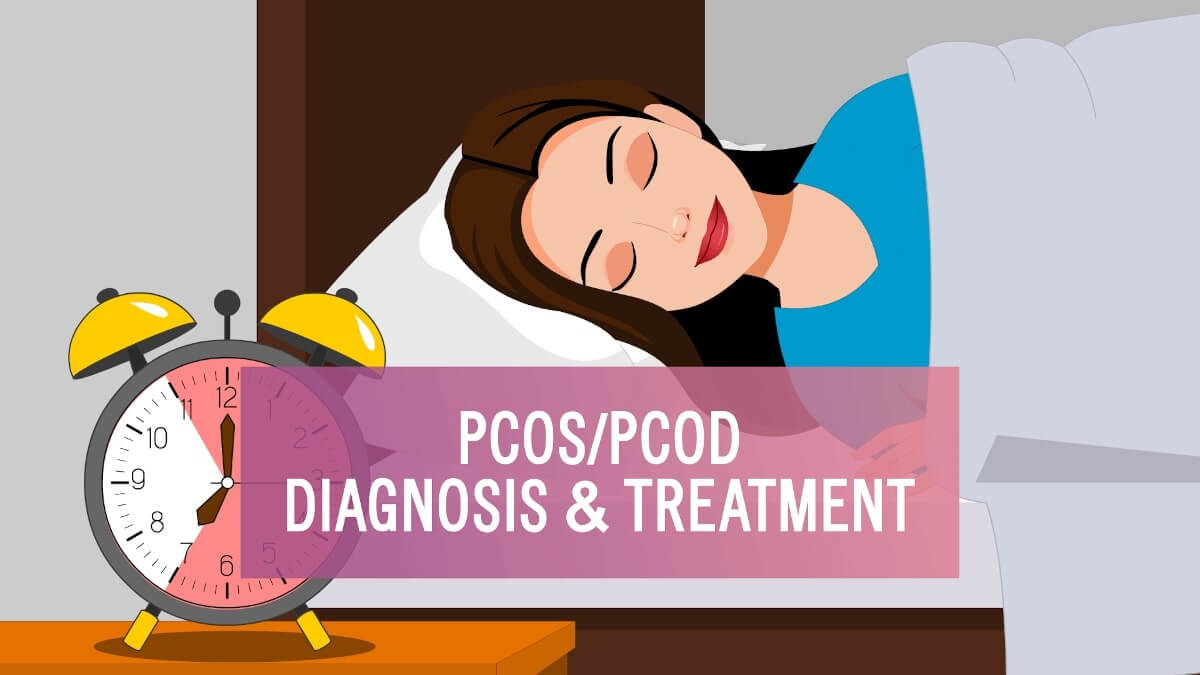Polycystic Ovarian Disease or Polycystic Ovarian Syndrome is a condition that affects the hormone levels in females.
Polycystic Ovarian Disease or Polycystic Ovarian Syndrome is a condition that affects the hormone levels in females. This hormonal disorder usually affects women of reproductive age and affects how a woman’s ovaries work. Women suffering from PCOS/PCOD tend to produce higher than usual amounts of male hormones. This phenomenon makes their menstrual cycles irregular and causes difficulty in getting pregnant. Irregular menstruation means the ovaries do not ovulate regularly. In females suffering from this condition, they may experience abnormally heavy periods, a gap of more than 35 days between their cycles, and fewer than nine periods a year.
PCOS/PCOD also causes excessive hair growth on the face and body and may also result in baldness. It may also result in long-term health problems like cardiac issues and diabetes. This hormonal imbalance is treated by the use of diabetic drugs and birth control pills.

Symptoms of PCOS/PCOD:
Some of the most common signs and symptoms noticed in women suffering from PCOS/PCOD are:
- Weight gain, especially around the waist
- Difficulty losing weight
- Extra hair growth, thinning hair, or hair loss on the scalp
- Acne on the face, chest, and upper back
- Oily skin
- Mood swings
- Fatigue
- Dark patches of skin on the face
- Pain in the pelvic region
- Infertility or trouble conceiving
- Depression
- Polycystic ovaries – in this condition, ovaries become enlarged and contain many fluid-filled sacs surrounding the eggs.
- Irregular, infrequent, or prolonged menstrual cycles.

Diagnosis of PCOS/PCOD
PCOS is a common phenomenon affecting as many as 5 million women in India. To make a diagnosis of this condition, two or more of the below-mentioned symptoms are proof enough:
- A high level of certain hormones like follicle-stimulating hormone, luteinizing hormone, estrogen, testosterone, sex hormone binding globulin, human chorionic gonadotropin, anti-mullerian hormone, etc.
- Irregular and infrequent periods
- Existence of 12 cysts or more. The cysts are detected with the help of a sonography exam as it provides enhanced visualization of the internal structure of the ovary making it easy to detect the presence of any abnormal growth (cysts).
In case you are experiencing any issues with menstrual cycles, inability to conceive, excess androgen levels, or any of the symptoms mentioned above, kindly consult a trained medical professional. The doctor will suggest blood tests and make a physical examination of your body and ovaries. However, the doctor will first rule out the possibility of a thyroid problem before recommending tests specific for detecting PCOS/PCOD.
The doctor will usually start with a narration of your health history, including any history of PCOS in your family, weight change patterns, and menstrual cycle chart. For an advanced and more definitive diagnosis, the doctor may suggest the below:
- Physical examination: Measure blood pressure, body mass index (BMI), waist size, and also examine for excess hair on the face, chest, or back, acne, or skin discoloration. All of these signs are a common indication of PCOS and thus, the doctor will thoroughly inspect your body for any of these signs. The doctor will also want to know your pregnancy history and whether your mother or other females in the family suffer from PCOS.
- Pelvic exam: A pelvic exam will be performed on the reproductive organs to inspect for masses, growths, or other abnormalities. Just like a regular checkup, the doctor will inspect and observe areas of the body including the cervix, vagina, fallopian tubes, uterus, rectum and ovaries. Any unusual discovery then may require a round of invasive tests and procedures.
- Pelvic ultrasound examines the ovaries for cysts and checks the endometrium (lining of the uterus or womb). Also called a sonogram, this test produces an image of your ovaries while you are lying down and the doctor holds an ultrasound device in your vagina. The doctor will then observe on a screen the lining of the uterus wall and if there are any cysts in the ovaries. In case of an abnormal menstrual cycle, the lining will appear thicker than usual.
- Blood tests: Blood tests check the androgen hormone levels. The doctor will also check for other hormone-related problems such as thyroid. Tests for cholesterol levels and diabetes may also be conducted. The collected blood sample will be tested for levels of various hormones such as – follicle-stimulating hormone, luteinizing hormone, estrogen, testosterone, sex hormone binding globulin, human chorionic gonadotropin, anti-mullerian hormone, etc.

Treatment for PCOS/PCOD:
There is no cure for this syndrome, but there are ways to manage the condition best. Lifestyle changes may be recommended along with the necessary medication. PCOS treatment focuses on addressing individual concerns, such as infertility, hirsutism, acne, or obesity, which may include:
- Hormonal birth control or contraceptive pills, or intrauterine hormone device (IUD)
- A combination of birth control pills
- Instead of pills, a skin patch or vaginal ring may also be used.
- Anti-androgen medicines
PCOS is a very common hormonal condition that affects women. It can be managed effectively once diagnosed via lifestyle changes and proper medication and treatment.
Special Thanks to Dr. Rakhi Singh (MBBS, DGO, DRM, DPE, FICOG, FIAOG, Senior Consultant and IVF Specialist) for the expert advice.








